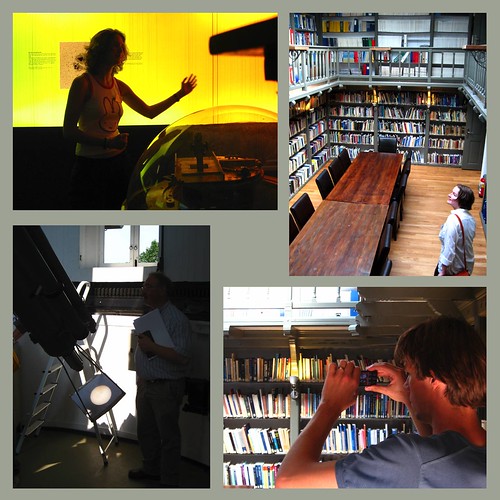A small impression first. I only took my camera out at the guided tour of the museum where the afternoon was held, at which the attendees expressed polite interest - until the tour finished at the old library room of the observatory, and the ooh-ing and aah!-ing commenced...

On to business. A theme of the talks, and the discussion, was how to make social networks work. Folksonomies depend heavily on scale: the more participants a network has, the better. But in reality, networks are isolar, divided, split... For example, you could leave a comment on this picture both here, on the blog, or on its flickr page. Two different networks that do not connect.
Kudos for Moqub for full transcripts. These are a few remarks that piqued my interest.
Liesbeth Mantel (Moqub):
Observation: 75% of internet users does not know the term web 2.0 - but uses it all the time (leaving comments, using ratings and 'trust' on eBay, etc.)
Example of a (public) library that has embraced content: Gail Library
I somehow missed Librarything for libraries - that's cool! Even though it still is an insolar community (only libraries), it packs more users than a single library has patrons.
Menno Rasch (UU):
As port of portal strategy, they actually have a working portlet for the catalogue, showing books ready to be picked up, and books already borrowed with a renew link! It should be nothing special but no way we could build this with our ILS... (yes, our vendor is a four-letter word). Good for them that they chose Aleph.
And yes, they get it: the portlet can be integrated in other portals, *outside* the uni's domain, such as netvibes! Way to go.
But alas, they don't get it as far as user-contributed content for Omega is concerned - they're very hesitant in adding that. Pity. They doubt if the 25k users would be enough to make it useful - and 'long tail' does not count as such.
Alexander Blanc (SURFnet):
Rather specialised talk on the Surfnet video portal and their plans for that. Much still unclear. Much relies on material from the (rather expensive) academia license. They would like to become a youtube, but it'll be an organisational challange as the whole model right now is based on institutional use. Also no plans for supporting CC-licensing yet, though he's not ruling it out either.
Taco Ekkel (Aquabrowser):
Aquabrowser has 250 library installations worldwide. Their idea: add usercontributed metadata to these and link them. That's smart. They promise to do it using open protocols for exchange of such data, that alas have still to be developed. There'll be an open API though. If that works out, it'd be terrific.
Interesting approach: no special tools for librarians - they can make lists, rate items and all that jazz, but librarians' accounts are in principle no different from patrons'. Wonder if that flies with the professionals, might be a hard sell to let go of the specialness. Hope it works - I'm sure the pros will still come floating on top, simply by the quantity and quality of their contributions, but that way the 'trust' those accounts build up will be based on actual accomplishments.
The charts of Aquabrowsers' internals look a lot like Primo's. They hint at full support for integrating federated search sources. Unfortunately, nothing's even planned for bringing all the Library2.0-goodies that the internal sources get to these. Technically I understand, but how am I going to explain this to the average researcher? And why?
Finally...
Interesting day. Good to see that Library2.0 is very much alive in the dutch library community. Also good to see that this is only the beginning. We've got a long road ahead - thinking on linking social networks together is only just starting out, and collaboratories and new forms of use and re-use of information objects weren't even mentioned in the discussions. For which their was, BTW, not enough time - the biggest drawback of this afternoon.
Famous last words
impromptu business cards - another use for MOO cards!

1 comment:
Hi Driek,
Thanks for the Kudos :)
It was nice to meet you in person.
Moqub
Post a Comment